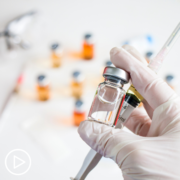Can Vaccines Play a Role in Preventing or Helping to Treat Lung Cancer?
Can Vaccines Play a Role in Preventing or Helping to Treat Lung Cancer? from Patient Empowerment Network on Vimeo.
What’s the latest in lung cancer research and treatment updates? Expert Dr. Lecia Sequist shares information about emerging research currently under study, new treatments that have shown success, and her perspective about second opinions for patient care.
Dr. Sequist is program director of Cancer Early Detection & Diagnostics at Massachusetts General Hospital and also The Landry Family Professor of Medicine at Harvard Medical School.
[ACT]IVATION TIP:
“…ask your doctor if they think a second opinion could be helpful.”
Download Resource Guide en español
See More from [ACT]IVATED NSCLC
Related Resources:
Transcript:
Lisa Hatfield.
Dr. Sequist, fortunately, the lung cancer arsenal keeps expanding. What promising treatments do you see on the horizon or that are newly available to lung cancer patients?
Dr. Lecia Sequist:
Yeah. The field is changing so fast, it almost makes your head spin. And I think it’s wonderful that there are so many options. It’s actually been a challenge for the doctors to keep on top of the latest treatments, because they’ve been coming out so fast, especially over the last five years.
And some of the things that I’m personally excited about in lung cancer is that there may soon be an opportunity to think about vaccines that could help prevent or could help treat lung cancers. That’s something that scientists are working on that aren’t available, but it does look like it’s realistic, that it could happen. Some of the technologies that helped develop, for example, the COVID vaccine in such a short period of time might be available to personalize treatment against an individual’s tumor. So my vaccine, if I got cancer, could be different than your vaccine if you got cancer, because they’re kind of personalized.
There’s also a new type of treatment called antibody drug conjugates, which are a smarter way of delivering chemotherapy. We’ve always just given chemotherapy to the whole body, usually through a vein, through an intravenous in the arm, and it drips in and it circulates around with the bloodstream. And the good thing about that is that it can go everywhere. So if there’s a cancer cell that’s hiding somewhere too small to be seen on the scan, the chemotherapy can get there. But it does, there’s a lot of collateral damage from toxicities from delivering chemo where there is no cancer. And with these antibody drug conjugates, the idea is that there’s an antibody in the front that’s honing into some kind of target on the cancer cell. And it still goes in through the IV, but when it reaches a cancer cell and attaches, then the backend sort of drops a bomb, which is a chemotherapy on that area.
So instead of the chemo being given to the whole body, every time the front end of this thing hits cancer cells, it engages and that triggers the backend, which is the chemotherapy kind of bomb to be dropped. So there are a lot of these types of drugs where it’s more like targeted delivery of chemo. Some of them have already been approved for cancers like breast cancer, but we don’t have an approved antibody drug conjugate in lung cancer yet. But there are a couple that are moving towards potential FDA approval. So I think given how complicated the new treatments are, my activation tip for patients would be to ask your doctor if they think a second opinion could be helpful. And I think a lot of patients feel that that might be rude or their doctor might not react in a positive way to them saying, do you think I should get a second opinion?
But as a physician, I can tell you that it’s not taken that way by most doctors. And in fact, a lot of oncologists will even suggest to their patients, you know, “Hey, this is a complicated area. I would love to get input from my colleague. I’m going to send you to a city nearby for a second opinion.” We all rely on our colleagues a lot, and not everybody can know everything about every cancer, especially with how quickly things are changing. So second opinions are not a sign that you don’t trust your doctor or you don’t like your doctor. It’s just a sign that you really want more input. The more minds, the more brains that are thinking about your cancer, the better. And don’t be afraid to ask your doctor if they think a second opinion could be helpful for your case.













